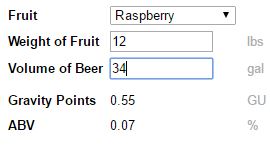Joe_CraftBeerTraders
Well-Known Member
Hey guys,
So I have searched and read pretty much all the threads on here relating to ABV and Fruit additions. I have seen on both side, fruits are mostly water so its negligible, fruits cause re-fermentation so there must be an ABV adjustment. Well for the life of me I could not find a calculator out there or at least a better reasoning besides "its negligible". So I decided to build one myself to really see what the contributions are and if they are negligible.
Here is the calculator
http://blog.craftbeertraders.com/fruit-gravity-alcohol-calculator/
So some background behind what I did and the calculator. First, it DOES take into account the water addition from the fruit. Second, it uses Corn Sugar at 1.037 as a representation of fruit sugars.
Here is my approach. If you look at Corn Sugar for 1lb of Corn Sugar in 1 Gallon of water the Extract Yield is 1.037 or 37GU. So for every lb of Fruit Sugar I would have 37GU as well. But we all know that fruit is not all sugar. So I looked up what the sugar grams per 100grams of fruit was for each fruit. So lets say a fruit had 8 grams of sugar per 100grams of fruit. Thats 8% sugar. So for every lb of that fruit I know 8% is sugar or 37GU * 8%. That is what I determined was the Fruit Extract Yield.
But what about the water? Fruit is comprised of mostly water so how is that taken into account. Well we know that a Gallon of water weights 8.33lbs which means 1lb of water is .120 gallons. So I looked up what the % of water is contained within a fruit. Lets say a fruit was 87% water. That means 1lb of fruit will contribute 87% * .120 gallons.
And then thats it! You now have the calculation. You can figure out the sugar contribution with the water contribution to find the Expected Yield and then the Potential ABV.
So what doesnt the calculator account for. Well the first major assumption is that you are 100% efficient at pulling out all the sugar from the fruit. Second, you are converting all of that sugar to alcohol. Two pretty big assumptions but my goal was to be able to provide some type of calculator to let people determine on their own if they want to include the ABV or not.
Let me know what you guys think. I would love to discuss it with you all.
So I have searched and read pretty much all the threads on here relating to ABV and Fruit additions. I have seen on both side, fruits are mostly water so its negligible, fruits cause re-fermentation so there must be an ABV adjustment. Well for the life of me I could not find a calculator out there or at least a better reasoning besides "its negligible". So I decided to build one myself to really see what the contributions are and if they are negligible.
Here is the calculator
http://blog.craftbeertraders.com/fruit-gravity-alcohol-calculator/
So some background behind what I did and the calculator. First, it DOES take into account the water addition from the fruit. Second, it uses Corn Sugar at 1.037 as a representation of fruit sugars.
Here is my approach. If you look at Corn Sugar for 1lb of Corn Sugar in 1 Gallon of water the Extract Yield is 1.037 or 37GU. So for every lb of Fruit Sugar I would have 37GU as well. But we all know that fruit is not all sugar. So I looked up what the sugar grams per 100grams of fruit was for each fruit. So lets say a fruit had 8 grams of sugar per 100grams of fruit. Thats 8% sugar. So for every lb of that fruit I know 8% is sugar or 37GU * 8%. That is what I determined was the Fruit Extract Yield.
But what about the water? Fruit is comprised of mostly water so how is that taken into account. Well we know that a Gallon of water weights 8.33lbs which means 1lb of water is .120 gallons. So I looked up what the % of water is contained within a fruit. Lets say a fruit was 87% water. That means 1lb of fruit will contribute 87% * .120 gallons.
And then thats it! You now have the calculation. You can figure out the sugar contribution with the water contribution to find the Expected Yield and then the Potential ABV.
So what doesnt the calculator account for. Well the first major assumption is that you are 100% efficient at pulling out all the sugar from the fruit. Second, you are converting all of that sugar to alcohol. Two pretty big assumptions but my goal was to be able to provide some type of calculator to let people determine on their own if they want to include the ABV or not.
Let me know what you guys think. I would love to discuss it with you all.


























































![Craft A Brew - Safale S-04 Dry Yeast - Fermentis - English Ale Dry Yeast - For English and American Ales and Hard Apple Ciders - Ingredients for Home Brewing - Beer Making Supplies - [1 Pack]](https://m.media-amazon.com/images/I/41fVGNh6JfL._SL500_.jpg)


